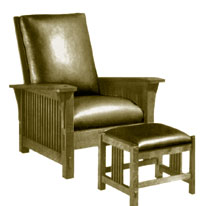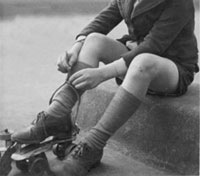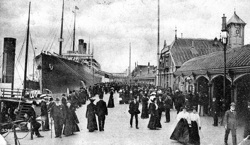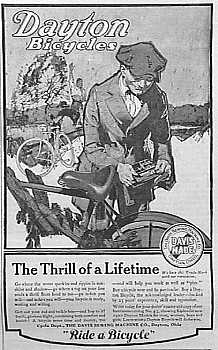Schools and Brothers (Click most images for larger versions.)
I don't remember much about my first school, except the toilets.
![]() Although, I do remember I had to walk a mile to get there—such a long way when it was cold. The public school was just two blocks up the street, but Mother placed me in a Catholic school. I was six but, because I could already read, they skipped me a grade. That meant I was in with older, larger children who teased me for being the smallest and disliked me for being the brightest—a horrible combination. The nuns were strict and didn't seem to care that students picked on me. I guess they felt it was part of my catechism. More than any of that, however, I hated the toilets.
Although, I do remember I had to walk a mile to get there—such a long way when it was cold. The public school was just two blocks up the street, but Mother placed me in a Catholic school. I was six but, because I could already read, they skipped me a grade. That meant I was in with older, larger children who teased me for being the smallest and disliked me for being the brightest—a horrible combination. The nuns were strict and didn't seem to care that students picked on me. I guess they felt it was part of my catechism. More than any of that, however, I hated the toilets.
They were on the play ground in an unheated tin building that smelled to high heavens when it was hot and froze you to death when it was cold. When I learned of the Inquisition, I thought they must have used toilets like that. I was too young to have much control over those things, but I did try to use those bathrooms as little as possible. I can remember running home, my bladder about to burst, trying to make it to our toilet, rather than use those at school. The things kids remember...
 It was the first semester of my second year at that school when Mother started getting big; and although I didn't know why at the time, I also remember her fainting at some point during her pregnancy. But, at the time I didn't understand. When I asked her what was happening, she would only say something about a stork being on the way.
It was the first semester of my second year at that school when Mother started getting big; and although I didn't know why at the time, I also remember her fainting at some point during her pregnancy. But, at the time I didn't understand. When I asked her what was happening, she would only say something about a stork being on the way.
Then I woke up one morning, November 5, 1920, and a baby was in the apartment: Harry J. Hillis. He was wrapped in blankets on the Morris chair with the ironing board through the arms to keep him from falling out.
(This picture shows one style of Morris chair. They all share the slated sides through which an ironing board can be shoved.)
Mother had given birth in the apartment. If she suffered much pain during the delivery, she held it in, because I don't remember any outcries during the night. Of course, I guess it depends on how sound a sleeper I was. Nonetheless, I had another brother, a half-brother to be sure, but another small person was in the house besides me.
I remember helping Mother with Harry, learning about diapers and feedings, and how hard it could be to stop a baby's crying. I don't know whether it was colic or earaches or what, but Harry was "a little squealer," as Mother called him. It's funny, but whenever I think of Harry's entrance into my life, even now, I also think of roller skates. For, it was when he was a baby that I learned to skate, and finally received my own pair.
 Like the rings, my skates gave me such a sense of accomplishment, but also a new feeling of freedom. I hated it when Mother called me in from my skating practice to help with Baby Harry. It wasn't Harry's fault, but I tended to resent the constant care he seemed to require. Having another small person in the house wasn't that much fun after all. But then Buster came home!
Like the rings, my skates gave me such a sense of accomplishment, but also a new feeling of freedom. I hated it when Mother called me in from my skating practice to help with Baby Harry. It wasn't Harry's fault, but I tended to resent the constant care he seemed to require. Having another small person in the house wasn't that much fun after all. But then Buster came home!
Oh, when I heard the news I was ecstatic. I couldn't quite remember what he looked like, but I wanted him home so bad I could taste it. Since Harry proved more of a burden than a boon, Buster coming home was my last hope for a reprieve from Ike's punishments. I realize now that it was a selfish reason, but I wanted Buster home anyway it came. Of course, I didn't know that his return would spell hardship for Buster.
I thought Mother and Ike had made some kind of agreement concerning Buster. That his return was dependent on Mother having another child or something. The truth of it is, Buster was brought back from Ireland to be put to work. With the extra mouth to feed—Harry's—Ike's salary was being spread pretty thin. So, the thinking was Buster could make enough to smooth over the hard spots. No one knew this at the time, except Ike and, I would guess, Mother. Hopefully, she capitulated because she wanted Buster home, too, but life was going to go from bad to much worse for the unsuspecting boy.
I can't remember what work he did at first, though I seem to remember him working at a store on our street, because there is an image in my head of him with a broom standing in the doorway. But, work he did, even at his young age of twelve. He put in a full day, and was not allowed to go to school.
(Teena, Buster's youngest daughter, wrote that her father didn't talk about his youth, didn't like to remember those things. It's easy for me to understand why. First, he was robbed of his family life and left in Ireland. Then, he was brought back and put to work, literally robbing him again of his childhood. Who would want to remember that pain? Poor Buster.)
It was January of 1921 before the ticket money arrived with word for him to catch the boat, almost exactly five years from the day Mother and I left him in Termonfeckin.
It's too bad, but I'll never know whether Enrico Caruso's death that same year played a role in Buster's return. Was Mother finally able to handle the three of us, since her live-in employment had ended, or was the timing a coincidence? I'll never know the truth, since no one remembers when or why she stopped working for the diminutive tenor.
 At any rate, on February 9th Buster boarded the S.S. Celtic at Liverpool (pictured at left; click for larger version) and set sail for the States. Also on the ship, escorting the little eight-year old, was Lawrence Campbell, Mother's youngest brother. The ship's register says that Laurence was 27, and that both he and Buster's final destination was: "Brother: Pat. Campbell, 589 Columbus Ave., New York, N.Y." (That street was popular with my relatives.)
At any rate, on February 9th Buster boarded the S.S. Celtic at Liverpool (pictured at left; click for larger version) and set sail for the States. Also on the ship, escorting the little eight-year old, was Lawrence Campbell, Mother's youngest brother. The ship's register says that Laurence was 27, and that both he and Buster's final destination was: "Brother: Pat. Campbell, 589 Columbus Ave., New York, N.Y." (That street was popular with my relatives.)
Also, next to Buster's listing on the ship's register was a Norah O'Connor, an eighteen-year old woman who boarded in Liverpool, but was a natural born U.S. citizen, whose address was 349 Marion Street, Brooklyn, not far from our Myrtle apartment. However, the first address wrote down for her, which was subsequently crossed out, was ours: 292 Myrtle Avenue—it repeated on Buster's line just below. So, I have the feeling that Ms. Norah O'Connor was Buster's escort, too. Now, whether she went over specifically to come back with him, per chance the one who took the money for a ticket, or whether she was there and arrangements made for Buster to join her, I can't say—these are only guesses made according to Ellis Island's immigration records.
Yet, neither escort was there to save Buster's life when he nearly got washed overboard.
It seems the little tyke had had enough of the dank, cramped quarters for third class passengers, which included most of the Irish. Or perhaps seasickness drove him out, since the boat was pounding through high seas. But, for whatever reason, Buster snuck on deck. Unaware of any danger, he was hanging onto the railing, looking or puking over the side. Suddenly, the bow of the ship dipped and a giant wave broke over the bulwarks. sweeping him off his feet. The wave pulled him along, but just before it sucked him under the railing and over the side, a crewman grabbed Buster by the collar and jerked him to safety.
The sailor was probably as alarmed as Buster, but not so much that he didn't have the strength to give the wet, frightened little boy a verbal lashing. After the dressing down and a good shaking, the crewman yelled at Buster to, "Get back down below!" Buster's savior.

S.S. Celtic's register showing Buster's entry [click to download a large image you can enlarge for reading].
The day the S.S. Celtic arrived in New York—February 19—I sat on the stoop atwitter with expectation, waiting for my first glimpse of Buster walking up Myrtle Avenue. When he and Ike finally appeared, I still remember how excited I was as I ran down the street to meet them. But, as I drew nearer, the less I saw of the little boy I remembered; the sad-eyed child in the picture Mother kept.
This was a bigger Buster. He was taller and huskier, his body hardened by Termonfeckin chores and play. A stronger definition marked his ruddy facial features; it wasn't the soft visage I remembered. His clothes were different, a strange kind of cloth and cut, even to a little mick girl like me. It was his speech, however, that really was different. He'd acquired a heavy accent, along with foreign expressions that made him hard to understand. I was so happy, though, just to have Buster back, accent and all, that I didn't care.
Finally, there was someone else, someone for me to talk to and play with. I remember being so happy, even joyous, especially in the context of Ike's abusive behavior...or maybe because of it. Now, I had a comrade, a brother-in-arm, so to speak. Lord knows I needed one, but as it turned out I was the one doing most of the "protecting." And I think dealing with the bigger kids at school prepared me for this new role as my brother's keeper.
Just before I turned eight that year, I earned a reputation as "The Tough Girl."
Poor Buster. He wasn't comfortable in Brooklyn. He wanted to go back to Ireland, and in large part because "our gang" mercilessly kidded him about his Irish speech and mannerisms. Well, I felt it was my duty to defend him, although he was two years older, so I stood up to the bullies.
 Mother and Dad, seeing Buster's dismay, gave him a new bike to cheer him up. One day, he and I were walking the bike home and discussing its merits when we noticed Charlie Nelson standing in front of our building, trying to look tough. Charlie was eleven and bitter because none of the boys his age liked him, which made him the worst bully we knew. He delighted in tormenting us and being the villain to our gang. As Buster and I approached, Charlie pulled his cap down over one eye, shoved his hands in his pockets, and propped a foot on a step to block our path. He was intimidating, and I wished the rest of our gang was there.
Mother and Dad, seeing Buster's dismay, gave him a new bike to cheer him up. One day, he and I were walking the bike home and discussing its merits when we noticed Charlie Nelson standing in front of our building, trying to look tough. Charlie was eleven and bitter because none of the boys his age liked him, which made him the worst bully we knew. He delighted in tormenting us and being the villain to our gang. As Buster and I approached, Charlie pulled his cap down over one eye, shoved his hands in his pockets, and propped a foot on a step to block our path. He was intimidating, and I wished the rest of our gang was there.
"Say, why don't you let me take that new bike for a ride?" Charlie more or less demanded.
Buster opened his mouth, but nothing came out. [This is a 1920's magazine ad for Dayton bicycles like Buster's.]
"Guess that means it's okay then," Charlie said with a laugh when Buster couldn't say anything. Charlie grabbed the bike and rode off.
Buster turned to me with a soft, hurt, puzzled expression. I didn't know what to do, but I was sick of Charlie pushing us around. I began to get angry. I told Buster we'd fix Charlie when he got back, but it grew dark as we waited under the vestibule's sputtering gas jet. Night had fell before we spotted him riding up out of the darkness. Buster and I anxiously ran down the steps to get the bike back and look for damage.
"Nice bike," Charlie said with a sneer. "From now on I'm grabbing a ride whenever I feel like it."
By then I was furious and totally frustrated with people always picking on Buster. I said to myself, "That's it!" Then walked right up to the bully and said, "No you won't, Charlie. I won't let you. You think you can bully my brother around just because he's different and doesn't know our ways, but I'm not afraid of you!" Then I made a fist and socked him in the eye.
I don't think it was a very hard blow, but Charlie lost his balance and went down, tangled up with the bike. When he got back up some of our gang had arrived, so Charlie took off. I guess he didn't want to hit a girl or, what's more likely, get hit by one again.
I think I was more surprised than anyone else; I hoped they wouldn't notice my knees shaking. They didn't, and I became a hero in their eyes. Not only that, but they started being a lot nicer to Buster, too. That experience more than any other taught me to stick up for myself. If people don't know that what they are doing upsets you, how are they ever going to find out unless you tell them?
Another reason why I loved having Buster home was Christmas. Without him there wasn't anyone to share my excitement with—Mother and Ike were always so tired and unresponsive. I didn't know that they were dead on their feet from staying up late to make it all possible.
 On the day before Christmas, there wasn't a sign of it in our house. Sure, Mother had steamed plum pudding for the previous six weeks, and packages had arrived from Scotland and Ireland bringing Scottish shortbread and Irish soda bread, plus plum pudding that Mother always said was better than hers. But, had someone visited our apartment on December 24th, nothing would have told them Christmas was the very next day. On top of that, we didn't get out of school until the 24th, so the suspense was almost unbearable. You just couldn't believe that Santa Claus would be there before the morning or that there would be a tree and lights and ornaments—how could he accomplish so much?
On the day before Christmas, there wasn't a sign of it in our house. Sure, Mother had steamed plum pudding for the previous six weeks, and packages had arrived from Scotland and Ireland bringing Scottish shortbread and Irish soda bread, plus plum pudding that Mother always said was better than hers. But, had someone visited our apartment on December 24th, nothing would have told them Christmas was the very next day. On top of that, we didn't get out of school until the 24th, so the suspense was almost unbearable. You just couldn't believe that Santa Claus would be there before the morning or that there would be a tree and lights and ornaments—how could he accomplish so much?
It wasn't possible! [This image is very reminiscent of our mornings.]
I would get so worried, knowing that this year it wouldn't happen, that this year Santa wouldn't make it. We'd wake up to disappointment. I would fall asleep praying for him to have the strength to pull it off again. Then, Christmas morning at the first hint of light, off we went in a terrible tizzy to see whether he had.
Our relief was palpable as we ran into the living room to find the huge tree reaching to the ceiling, shining, glistening, smelling of pine; and sheltering gifts under its boughs. The stacks of packages seemed mountainous. Buster and I would stare in wonder, amazed at all that had occurred since we went to bed, but Mother and Dad were always so tired. We would bring our gifts to show them and, bless their hearts, they tried to look surprised, to share in our excitement, but exhausted from the night's ordeal, faking emotion was too much for them.
Nonetheless, it was a very, very special day for us kids.